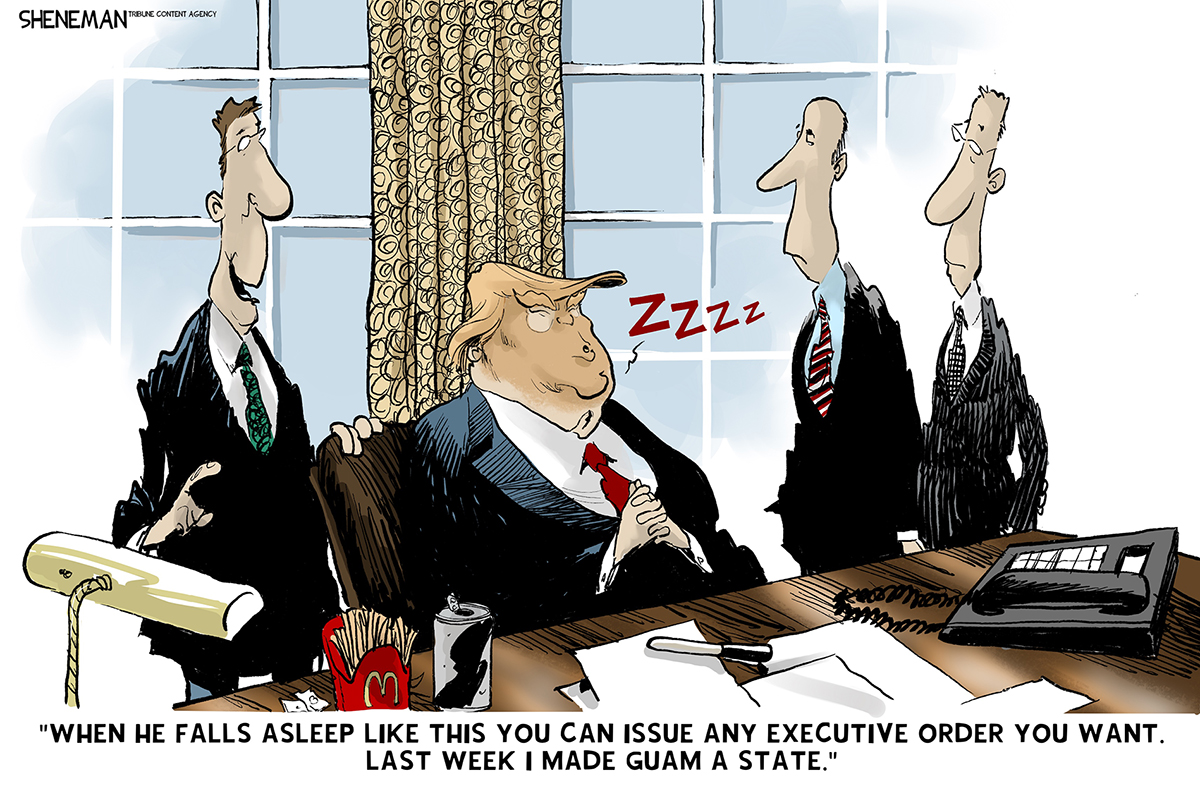Nancy Pelosi doesn't care if you hate her
The Democratic leader riles up the right-wing, but her face is not deciding elections


Nancy Pelosi welcomes your hatred.
Okay, that may be an exaggeration. But when the Republican Party spends so much of its time talking about her, you'd think she'd be a bit more perturbed. And there's no sign she is.
She has good reason. We just saw yet another election in which Republicans tried everything they could do to tie the Democratic candidate to Pelosi, and he won anyway. Conor Lamb, the victor in that Pennsylvania special election, said at the campaign's outset that he wouldn't be voting for Pelosi for speaker in 2019 if he were elected, since he thought the time had come for a new generation to take control (Pelosi, who's 77, has been in Congress for over 30 years). That might not have made Pelosi feel good, but she's as hard-headed as they come, and if it helped win a seat for Democrats, she wasn't going to complain.
The Week
Escape your echo chamber. Get the facts behind the news, plus analysis from multiple perspectives.

Sign up for The Week's Free Newsletters
From our morning news briefing to a weekly Good News Newsletter, get the best of The Week delivered directly to your inbox.
From our morning news briefing to a weekly Good News Newsletter, get the best of The Week delivered directly to your inbox.
But we don't know whether it actually did help. Perhaps Lamb's stance defused the attack (though it certainly didn't stop Republicans from making it), or perhaps when people are voting for their member of Congress, they don't much care who the party's leader is.
That sounds like a radical thing to say, but the truth is that we have zero evidence that it actually changes any votes when every Republican candidate shouts "My opponent is just a puppet of San Francisco liberal Nancy Pelosi!" There's no question that Republican voters dislike her, but that's very different from her actually having an effect on the outcome of any race. But we've been seeing those ads for so long we just assume they must make a difference.
Most people would probably be surprised to learn that Speaker of the House Paul Ryan is just as unpopular as Pelosi. Both of them have approval ratings of around 30 percent (see here or here), while Mitch McConnell is the really unpopular one; sometimes his approval is below 20 percent.
When she gets asked about the attacks on her, Pelosi sometimes dismisses them by saying that Republicans would attack any Democratic Party leader, which is absolutely true. It's also true that because of her gender she's the target of particular venom. But it really has to do with the nature of our contemporary partisan polarization.
A free daily email with the biggest news stories of the day – and the best features from TheWeek.com
Today we have two parties that are as far apart ideologically, and as internally unified, as they've been in any of our lifetimes. For many years the Republicans were moving to the right far faster than the Democrats were moving to the left, but recently Democrats have begun to catch up; by 2020 every Democratic presidential candidate will probably support single-payer health care, a $15 minimum wage, and even marijuana legalization.
When you have those ideological divisions, each party's leadership will inevitably reflect where the party is; you aren't going to get a presidential nominee or a congressional leader who comes from the Democratic Party's right flank or the Republican Party's left flank.
That means that members of each party will come to despise the other party's leaders, and Republicans have had ample time to get to hate Pelosi; she has led House Democrats for the last 15 years.
But even in that context of polarization, both parties have to compete in places where there are lots of the other party's voters around. Charging your opponent with being too close to his or her party's leaders is a good way to rile up your own base. In a district like that one in Pennsylvania, which Donald Trump won by 20 points, it was a guarantee that ads with Pelosi's face would turn up.
That doesn't mean there isn't a reasonable argument to be made that it's time for Pelosi to step aside. I've taken the position that she ought to make clear now that she'll lead the Democrats only through the 2020 election, which would allow her to use her skills of opposition to fight the Trump administration while preparing the ground for a successor to take over. Amidst the bogus criticisms of Pelosi, there's one that rings true: She hasn't done enough to cultivate the next generation of Democratic leaders in the House and prepare them to take over when she and the other members of the leadership (who are also in their 70s) decide to retire.
In this year's election, more Democrats running in conservative districts will be following Conor Lamb's lead and saying publicly they won't support her for speaker. Pelosi is likely to take the same position with them that she took with Lamb: If you think it's going to help you win, go right ahead.
That being said, there's no question Pelosi is in a tricky position. After the 2016 election, 63 members of her caucus voted against her in the leadership election (though it's a lot more tempting to do that when your party just lost), and people speak more openly than they used to about her stepping down.
Last year when she was asked about Republican attacks on her, Pelosi responded, "I think I'm worth the trouble, quite frankly." There was a time when few Democrats would have questioned that assertion. People who understand how Congress works will tell you that Pelosi has been one of the most effective legislative leaders in American history, keeping her caucus together and shepherding legislation with a toughness and skill Paul Ryan can only dream about.
Her time in Congress may be winding down, but we know for sure that Republicans won't stop attacking her — and she couldn't care less.
Paul Waldman is a senior writer with The American Prospect magazine and a blogger for The Washington Post. His writing has appeared in dozens of newspapers, magazines, and web sites, and he is the author or co-author of four books on media and politics.
-
 Paddington: The Musical – a ‘funny, feel-good, family-friendly’ show
Paddington: The Musical – a ‘funny, feel-good, family-friendly’ showThe Week Recommends The cast take a ‘well-known story’ and ‘melt your heart’ with this triumphant production
-
 Political cartoons for December 4
Political cartoons for December 4Cartoons Thursday’s political cartoons include a nap for Donald Trump, rage bait of the year, artificial intelligence turning on its master and more
-
 Wake Up Dead Man: ‘arch and witty’ Knives Out sequel
Wake Up Dead Man: ‘arch and witty’ Knives Out sequelThe Week Recommends Daniel Craig returns for the ‘excellent’ third instalment of the murder mystery film series
-
 Has Zohran Mamdani shown the Democrats how to win again?
Has Zohran Mamdani shown the Democrats how to win again?Today’s Big Question New York City mayoral election touted as victory for left-wing populists but moderate centrist wins elsewhere present more complex path for Democratic Party
-
 Millions turn out for anti-Trump ‘No Kings’ rallies
Millions turn out for anti-Trump ‘No Kings’ ralliesSpeed Read An estimated 7 million people participated, 2 million more than at the first ‘No Kings’ protest in June
-
 Ghislaine Maxwell: angling for a Trump pardon
Ghislaine Maxwell: angling for a Trump pardonTalking Point Convicted sex trafficker's testimony could shed new light on president's links to Jeffrey Epstein
-
 The last words and final moments of 40 presidents
The last words and final moments of 40 presidentsThe Explainer Some are eloquent quotes worthy of the holders of the highest office in the nation, and others... aren't
-
 The JFK files: the truth at last?
The JFK files: the truth at last?In The Spotlight More than 64,000 previously classified documents relating the 1963 assassination of John F. Kennedy have been released by the Trump administration
-
 'Seriously, not literally': how should the world take Donald Trump?
'Seriously, not literally': how should the world take Donald Trump?Today's big question White House rhetoric and reality look likely to become increasingly blurred
-
 Will Trump's 'madman' strategy pay off?
Will Trump's 'madman' strategy pay off?Today's Big Question Incoming US president likes to seem unpredictable but, this time round, world leaders could be wise to his playbook
-
 Democrats vs. Republicans: who are US billionaires backing?
Democrats vs. Republicans: who are US billionaires backing?The Explainer Younger tech titans join 'boys' club throwing money and support' behind President Trump, while older plutocrats quietly rebuke new administration
